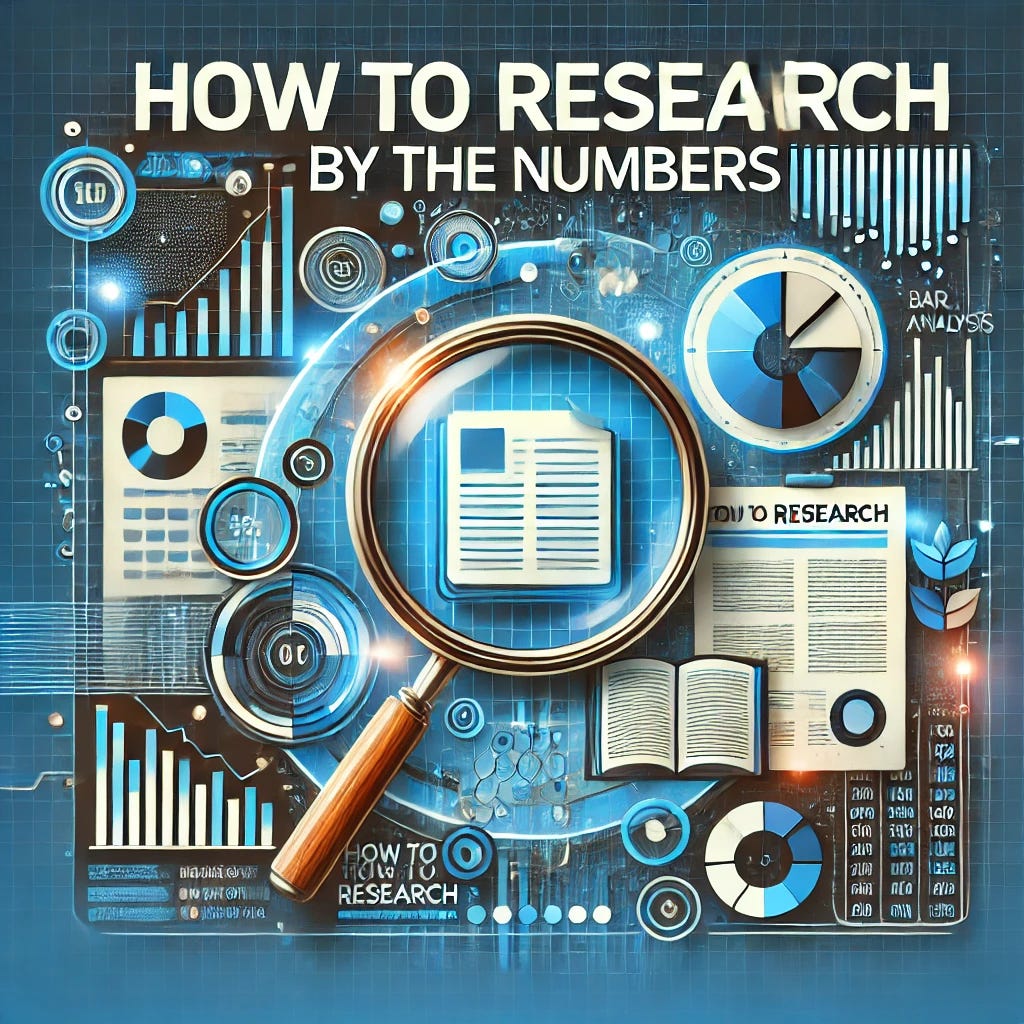How to Research
A By-the-numbers method to get started
Researching can be the most frustrating and rewarding part of the writing process. Researching builds expertise and a holistic understanding of any given topic. It helps an individual or a team reach a deeper level of understanding and is the cornerstone of any journal article. It bridges information and knowledge to empower our writing.
The Command and General Staff College Writing Guide, ST 22-2, provides a simple writing process that anyone can follow. After selecting a topic and creating a plan, the next challenge is researching, which can often seem exhausting before we begin.
If you don’t know how or where to start your research journey, here is a step-by-step guide to help you get started.
Researching By-the-numbers
Define Your Objective:
Once you know what you are writing about, the first step is to clarify the purpose of your research. When writing an article or preparing a presentation, you must consider your overall goal.
Argumentative. Argumentative research will focus on presenting one or more perspectives on an issue. Your task is to take a clear stand and persuade your audience to support your evidence-based argument. This type of research aims to convince and engage readers.
Expository. Expository research builds knowledge about a selected topic. Your purpose here is to communicate information clearly and objectively. Think of it as illuminating the subject matter for your audience without taking a specific stance.
Analytical. Analytical research examines existing research from various sources. Your role is to critically examine these findings, draw conclusions, and present them. This type of research emphasizes your ability to synthesize and interpret existing knowledge.
After defining your purpose, you must develop research questions to guide you. These questions may become easier after you identify what you already know and do not know about your topic. Your research questions should be open-ended probing questions such as why, how, and what if.
Locate Information:
To collect data for exploration and processing, simply knowing where to start can be a game changer. Use the following sites and repositories to begin your search. In most databases, you can limit the search results by filtering them by years of publication, scholarly journals, peer-reviewed journals, expert publications, etc.
Google Scholar: General academic research
JSTOR: Access to scholarly articles
DTIC (Defense Technical Information Center): Military-focused research
US Army Heritage and Education Center: Historical military archives
Army University Press: The US Army’s premier press organization hosts a suite of publication platforms and educational services
Combined Arms Research Library: Fort Leavenworth’s library has a treasure trove of military documents, old doctrine, and student papers.
Army journals back collections. These can be hard to navigate, but are rich resources.
Evaluate your Sources:
Once a substantial amount of data and knowledge have been collected, it can be challenging to sort and distinguish relevant and credible sources of information. Use the table below to evaluate credible sources and decide what should stay and what should go.
“Effective arguments require convincing evidence from trustworthy, objective sources. Scholarly works written and peer-reviewed by experts make the strongest evidence (Table 4). Avoid noncredible sources that lack expert authorship” (Lythgoe, et al, 2024, p. 10)
Conduct In-Depth Research:
When engaging with scholarly material, approaching it with a critical mindset is essential. This includes policy and expert sources. Consider the author’s experience, affiliations, potential bias, and their stated mission. Find multiple perspectives on the same topic and evaluate each separately. Compare authors and sources and assess their similarities, differences, assumptions, fallacies, and gaps in their arguments and evidence. Evaluate whether the author’s reasoning is logical, evidence-based, opinionated, or biased. Identify gaps and unanswered questions and follow those gaps as you continue your investigation. Thinking critically is about engaging with your topic thoughtfully, not simply being dismissive (Paul & Elder, 2020).
Organize:
Take notes to organize ideas and insights. Begin paraphrasing ideas to allow your writing to take shape in your voice. Brainstorming can help generate new ideas that may develop from your research. Mind mapping may help you organize and find relationships of new ideas from brainstorming and creating an outline. “Outlines help writers visualize an essay’s organization and flow. As writers research a topic, organizing the research in an essay outline can be useful. Writers can then use the outline as a guide when drafting” (Lythgoe, et al, 2024, p. 11).
Cite:
Citing sources is essential for several reasons: Credit attribution acknowledges the original creators or researchers whose work you use. Proper citations enhance the credibility of your arguments. Citations provide evidence of your research and support your claims. Finally, by citing, you contribute to ongoing scholarly conversations (Lythgoe, et al, 2024, p. 7).
Proper citation is not just about avoiding plagiarism; it’s a way to engage with the academic or professional community and move the discussion forward. Using citation software such as Zotero, EndNote, and Mendeley can save writers time by producing footnotes and bibliographies with a few clicks.
“Coming Full Circle”
In their articles, Tyson Crosby, Zachary Szewczyk, and Brennan Deveraux discuss the Army’s renewal of the branch journals, including the NCO Journal. These publications allow soldiers and leaders to share innovative insights, observations, acquired knowledge, and practical advice to influence change. The Chief of Staff of the Army and the Sergeant Major of the Army have empowered leaders to actively engage in professional discourse and contribute to the growth of our profession.
Conducting research when contributing to the Army’s body of knowledge is essential to facilitating healthy adaptation across the force. It prevents us from “coming full circle” and painfully repeating mistakes or strengthens the points we are making. If you’re unsure where to start, use this guide to help you learn from the past as you work towards driving change.
Sgt. Maj. Jorge A. Rivera is an instructor at the Sergeants Major Academy and a contributing editor for the NCO Journal and Army University Press.






This a great tool to help writers get started!